Introduction
The U.S. immigration system is known for its complex bureaucracy, requiring various legal documents to process different immigration applications. One such important document is the Immigration Letter of Support – a letter written by an individual or organization to provide character verification, financial backing, or situational support for an immigrant’s case. Understanding its role and variations across states is crucial for those navigating the immigration process in 2025.
This article will provide an in-depth look at the types, purposes, and legal significance of an Immigration Letter of Support, with a particular focus on Texas, California, Maryland, Georgia, and Nevada. We’ll also cover news updates, legal changes, and statistical trends, ensuring you have the most up-to-date information available.
1. The Bureaucratic Framework of U.S. Immigration Documents
The U.S. Citizenship and Immigration Services (USCIS) and other government agencies require a variety of supporting documents to process visas, residency applications, asylum requests, and citizenship applications. Below is a list of the most commonly required immigration-related letters, including the Immigration Letter of Support:
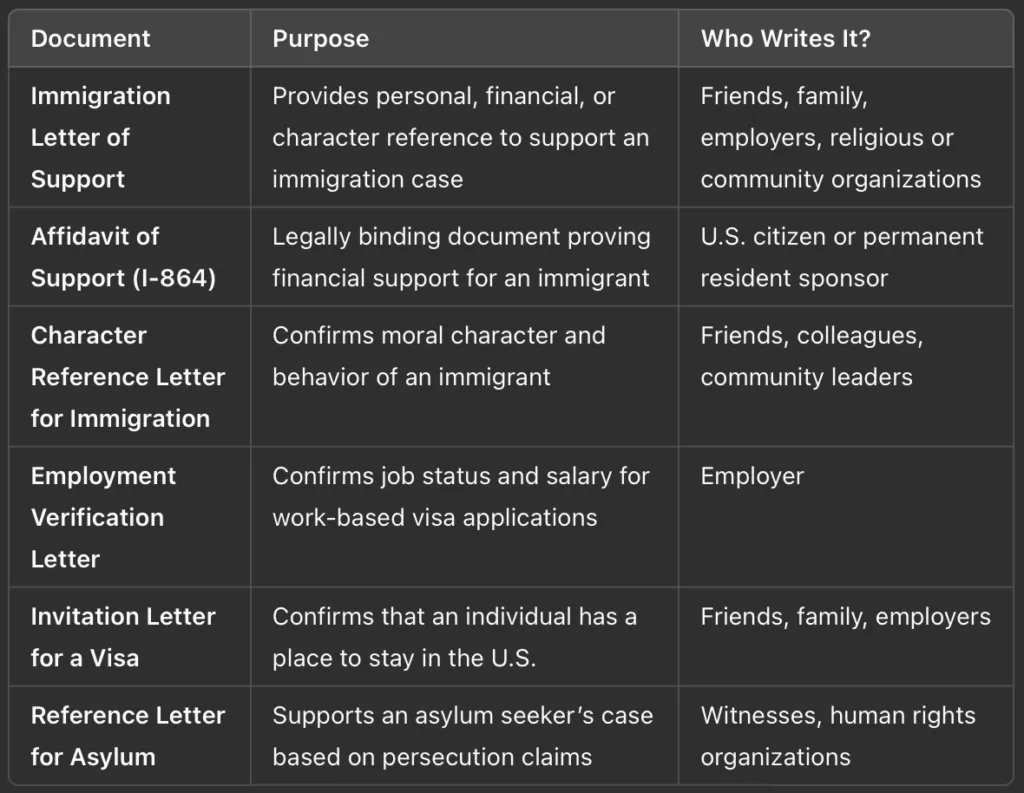
ℹ️ Source: USCIS Official Website
1.1. Immigration Letter of Support: Definition & Purpose
An Immigration Letter of Support is a non-legally binding document that provides additional credibility and support to an immigration case. It is commonly used in applications for family-based visas, work permits, asylum requests, and deportation defense.
ℹ️ Source: FindLaw – Understanding Immigration Letters
2. Types of Immigration Letters of Support & Geographic Differences
Not all Immigration Letters of Support are the same. Below are the primary categories of these letters:
2.1. Types of Immigration Letters of Support
- Personal Letters: Written by friends or family to establish the applicant’s character, behavior, and reliability.
- Employment-Based Letters: Provided by an employer to confirm the immigrant’s work history and contributions.
- Financial Sponsorship Letters: Ensures that the immigrant has financial stability or a sponsor to support them.
- Community or Religious Letters: Written by churches, NGOs, or community groups to support humanitarian or asylum applications.
ℹ️ Source: LegalZoom – Immigration Support Letters
2.2. Why Geographic Differences Matter
Different states have varying immigration policies, judicial interpretations, and demographic trends, which can impact the effectiveness of an Immigration Letter of Support.
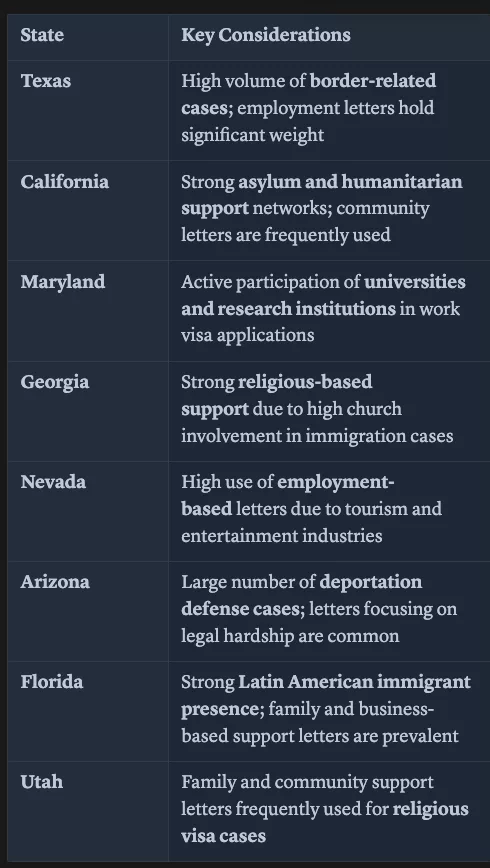
ℹ️ Source: Pew Research Center – Immigration Trends by State
2.3. Who Participates in an Immigration Letter of Support?
- Family Members: Parents, siblings, spouses, or close relatives who provide character references.
- Employers: Providing confirmation of work and financial stability.
- Community Leaders: Religious organizations, non-profits, or social groups.
- Legal Representatives: Immigration attorneys can submit letters alongside formal petitions.
ℹ️ Source: American Immigration Lawyers Association
2.4. The Role of USCIS & Immigration Letters in Public Life
The USCIS and immigration courts often evaluate supporting letters as part of their discretionary power when deciding on visa, residency, or deportation cases. While these letters are not mandatory, they can greatly influence a case by demonstrating community ties, moral character, and financial stability.
ℹ️ Source: USCIS Policy Manual
3. Recent News & Legal Updates (2025)
The U.S. immigration system is constantly evolving, and keeping track of recent policy changes is crucial. Below are notable updates in 2025 affecting Immigration Letters of Support:
▸ Texas & Florida: Stricter verification for sponsorship letters – The 2025 policy changes now require additional proof of financial stability for sponsors supporting family-based applications.
▸ California: Expansion of legal aid for asylum seekers – Several nonprofits have expanded their legal services, making community letters even more critical for asylum applications.
▸ Federal Changes: Increased emphasis on employer-based sponsorships – Work visa applicants now require more employer-backed letters, especially in industries with labor shortages.
ℹ️ Sources:
- American Bar Association Immigration Updates
- Department of Homeland Security – Immigration Policy
- CNN Immigration News
4. How to Write an Immigration Letter of Support
4.1. Key Elements of a Strong Immigration Letter of Support
- Formal Structure: Clear introduction, body, and closing statement.
- Specific Examples: Real-life stories demonstrating the applicant’s character, work ethic, or need for support.
- Official Documentation: If applicable, attach supporting evidence such as work records or community involvement letters.
4.2. Writing Letters for Different States
- Texas & Arizona: Emphasize employment & economic contributions.
- California & Maryland: Focus on asylum, humanitarian aid, and social ties.
- Nevada & Florida: Highlight tourism & business investment.
4.3. Sample Immigration Letter of Support for a Family Member
A family-based Immigration Letter of Support should highlight:
- Relationship to the applicant
- Personal history and connection
- Why they deserve legal approval
- Closing statement reinforcing support
ℹ️ Source: USCIS Sample Letters
4.4. Letter of Recommendation for a Friend
When writing a letter for a friend, include:
- Your relationship and how long you’ve known each other.
- Examples of their positive character traits.
- Impact they have on their community and work.
ℹ️ Source: Legal Templates – Character Reference Letters
4.5. Ask AI: Choose your legal AI Service
Comparative Analysis of Document Automation Tools for Drafting Letters of Support
In the realm of document automation, several platforms offer functionalities to assist in creating letters of support. Below is a comparative analysis of five notable tools, highlighting their features, advantages, and potential drawbacks in the context of drafting such documents.
1. AI Lawyer
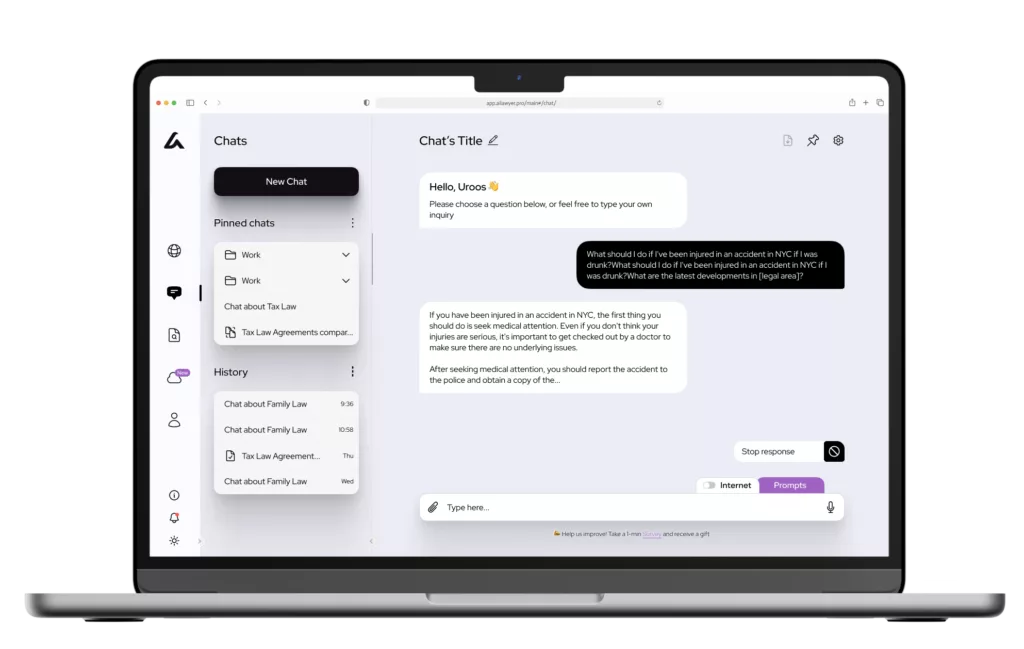
Description:
AI Lawyer is an advanced document automation platform leveraging artificial intelligence to streamline the creation of legal documents, including letters of support.
Pros:
• AI-Powered Drafting: Utilizes machine learning to generate contextually relevant content, enhancing accuracy and efficiency.
• Customization: Offers templates that can be tailored to specific jurisdictions and case types.
• User-Friendly Interface: Designed for ease of use, even for individuals without legal expertise.
Cons:
• Learning Curve: Users may require time to fully utilize AI capabilities effectively.
• Subscription Costs: Advanced features may be locked behind higher-tier subscriptions.
2. PandaDoc
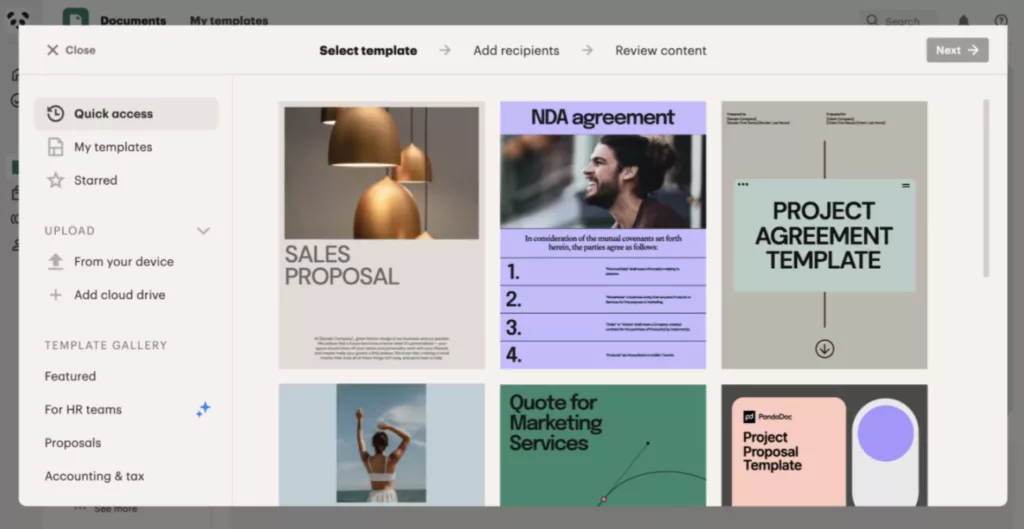
Description:
PandaDoc is a comprehensive document automation platform that facilitates the creation, management, and e-signature of various documents, including letters of support.
Pros:
• Template Library: Provides a wide array of customizable templates suitable for different purposes.
• Integration Capabilities: Seamlessly integrates with numerous CRM and business tools.
• E-Signature Functionality: Built-in electronic signatures streamline the approval process.
Cons:
• Complexity: The extensive feature set may be overwhelming for users seeking simple document creation.
• Cost: Some users find the pricing model less competitive compared to alternatives.
3. LexisNexis (ContractExpress)
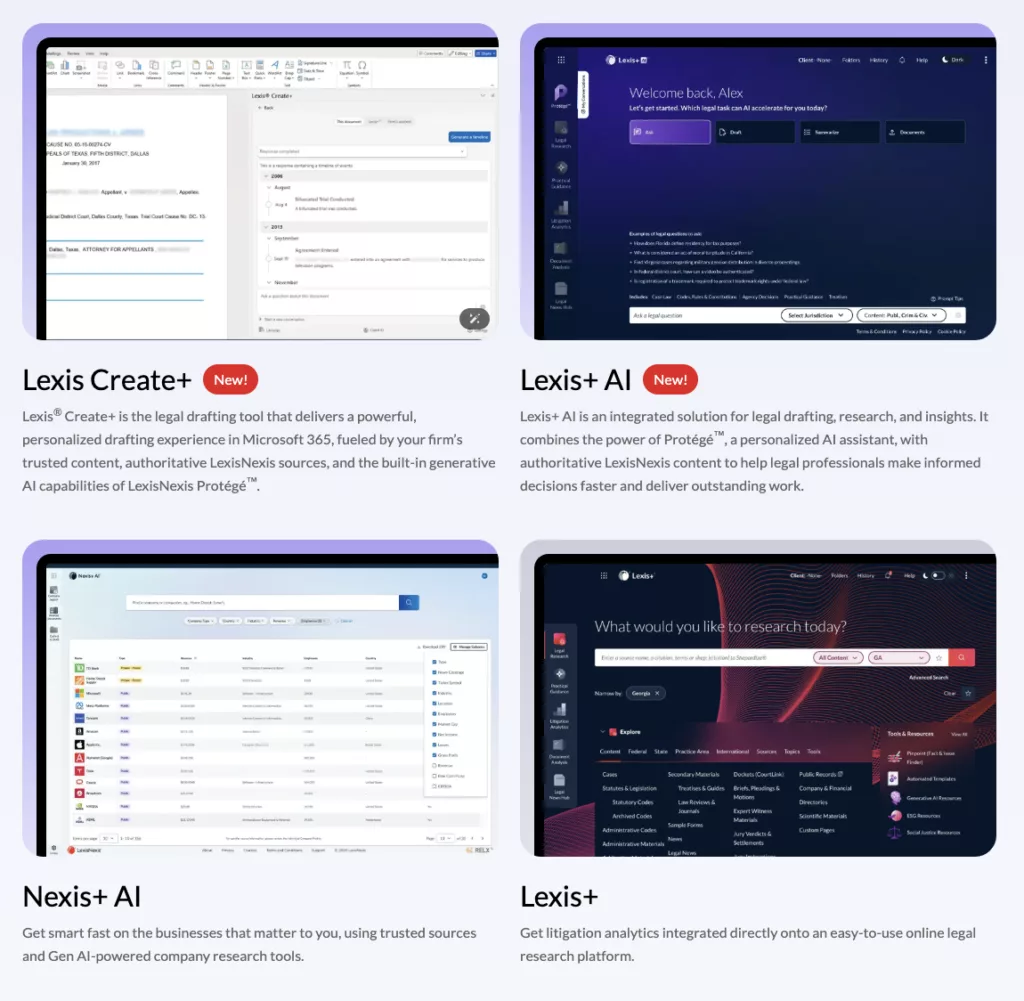
Description:
ContractExpress by LexisNexis is a document automation solution tailored for legal professionals, enabling the rapid creation of complex legal documents through intelligent templates.
Pros:
• Advanced Automation: Utilizes sophisticated logic to automate complex document assembly.
• Legal Expertise: Backed by LexisNexis’s extensive legal resources, ensuring up-to-date compliance.
• Customization: Highly customizable to fit specific legal requirements and firm standards.
Cons:
• Usability: May require legal expertise to set up and manage templates effectively.
• Pricing: Premium pricing may be prohibitive for smaller firms or individual users.
4. DocuSign

Description:
DocuSign is a widely recognized e-signature platform that also offers document generation capabilities, suitable for creating and signing letters of support.
Pros:
• E-Signature Leader: Industry-leading electronic signature functionality ensures secure and legally binding approvals.
• User-Friendly: Intuitive interface simplifies document creation and signing processes.
• Integration: Extensive integrations with various applications enhance workflow efficiency.
Cons:
• Limited Advanced Features: May lack some advanced document automation features found in specialized platforms.
• Cost: Pricing can be high, especially for users requiring advanced functionalities.
5. Adobe Sign

Description:
Adobe Sign, part of the Adobe Document Cloud, offers electronic signature and document management solutions, facilitating the creation and signing of letters of support.
Pros:
• Brand Trust: Backed by Adobe’s reputation for reliable and secure document solutions.
• Comprehensive Tools: Provides a range of features for document creation, editing, and signing.
• Integration: Seamlessly integrates with Adobe’s suite of products and other business applications.
Cons:
• Complexity: The broad feature set may be more than necessary for simple document tasks.
• Pricing: Considered premium-priced compared to some competitors.
Conclusion
Selecting the appropriate document automation tool for drafting letters of support depends on specific needs, such as the complexity of documents, integration requirements, user expertise, and budget constraints. AI Lawyer stands out for its AI-driven customization, while PandaDoc and DocuSign offer user-friendly interfaces with robust integration capabilities. LexisNexis’s ContractExpress is ideal for complex legal document automation, and Adobe Sign provides comprehensive document management solutions backed by a trusted brand.
5. Frequently Asked Questions (FAQ)
- Do I need to notarize an Immigration Letter of Support?
- No, but it adds credibility.
- Can a friend write an Immigration Letter of Support?
- Yes, as long as they can attest to the applicant’s character.
- How long should the letter be?
- 1-2 pages is standard.
- Should the letter include financial details?
- Only if it is a financial sponsorship letter.
- Is an attorney needed to draft the letter?
- Not required but recommended for complex cases.
- Can I submit multiple letters?
- Yes, different perspectives strengthen the case.
- Does USCIS verify these letters?
- Sometimes, especially if details seem unclear.
- Can a letter improve my chances of approval?
- It helps but doesn’t guarantee approval.
- Are there specific USCIS guidelines?
- No strict format, but clarity and relevance are essential.
- Where do I send the letter?
- It depends on the type of immigration case.
And other articles on the topic of immigration letters:



